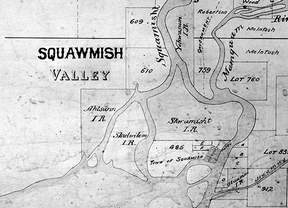Editor’s note: This is the third in a monthly series of articles by local historian Eric Andersen about Squamish’s history, marking 2014 as the 100th anniversary of the renaming of the community.
The name of the ߣ������people, the river, the valley and its wind has been spelled and pronounced several different ways by visitors and settlers of European background over the past 150 years.
The people and the place-name first enter European recorded history in the Hudson’s Bay Company’s Fort Langley trading post journals in the late 1820s.
The Fort Langley Journals refer to the “Chomes,” the “Whoolmes,” “Whoomus,” “Whooms” and “Whoomes” — all being attempts to name the people from Howe Sound and Burrard Inlet. The Hudson’s Bay Company men also called the ߣ������people “bold” and “impertinent”!
Explorer J.W. McKay, the leader of the 1858 first colonial government expedition through this valley (and himself of part-Aboriginal ancestry) wrote of the “Skow-komish” river and people.
McKay and other early explorers for the colonial government or British Navy did take some care in learning and recording names, to the best of their ability.
“Squamisht” was the most popular spelling during the 1860s through 1880s, as this had been adopted by the British Royal Navy map makers.
From the 1870s “Squawmish” or “Skwawmish” became the accepted spelling in provincial and federal government maps and reports — as in “Skwawmish Island Indian Reserve No. 21,” surveyed and named in 1876.
It is only in the 1890s that our current “Squamish” starts to become a popular spelling.
With the PGE railway company’s naming contest, the Geographic Board of Canada’s March 3, 1914 approval, and then a May 1, 1914 post office name change, “Newport” became “Squamish.” So, it was finally settled. However, it not really back to good old “Squamish.”
We can see from the steamship schedules and other records that this place had always been referred to as “ߣ������River” or “the Squamish” — and never just “Squamish.”
The use of “Squamish” was new in 1914, also in that it was attached to a brand new townsite that even a couple of years before did not exist!
In the 1930s, the ߣ������Indian Band leaders tried to encourage recognition of the “glottal stop” between the two syllables in the correct pronunciation of the name of the tribe — “Sko-mish.”
Linguists and anthropologists who have met and worked with the ߣ������people and studied their language over the years have used various ways to indicate this “glottal stop.” For example: “Sqcho’misch” (Franz Boas, 1888) or “Sk’qo´mic” (Charles Hill-Tout, 1897). Since the late 1970s, the B.C. Indian Language Project and ߣ������Nation Language Department linguists have recommended “Skwxwú7mesh.”




